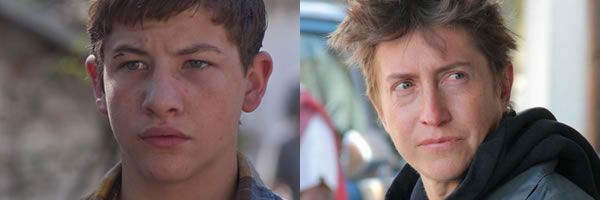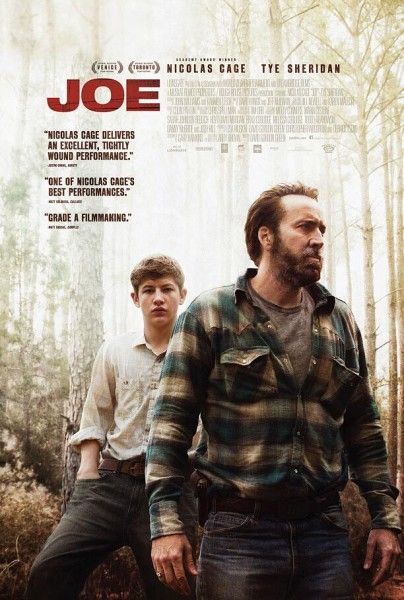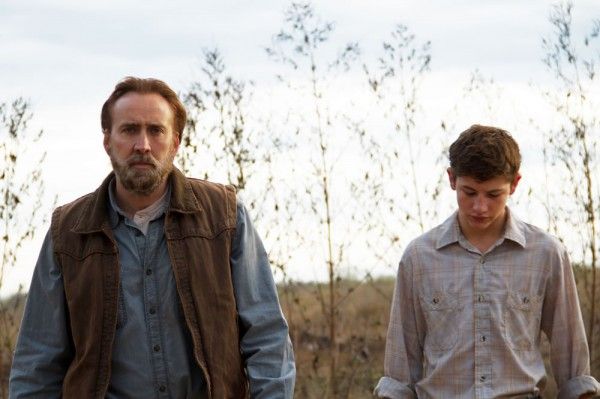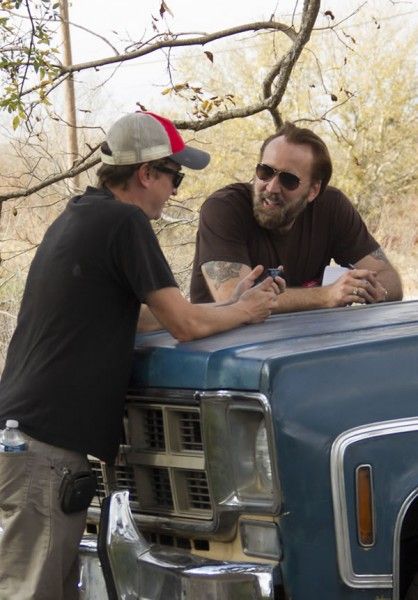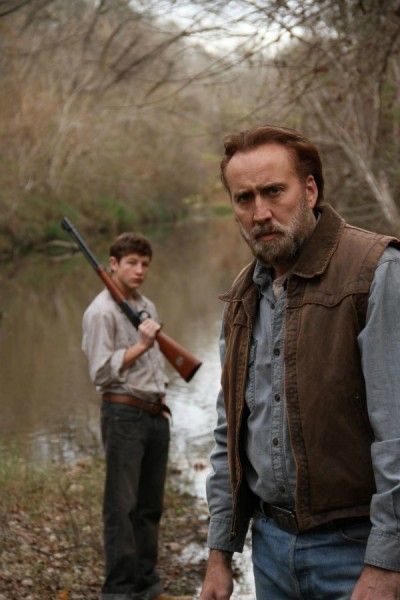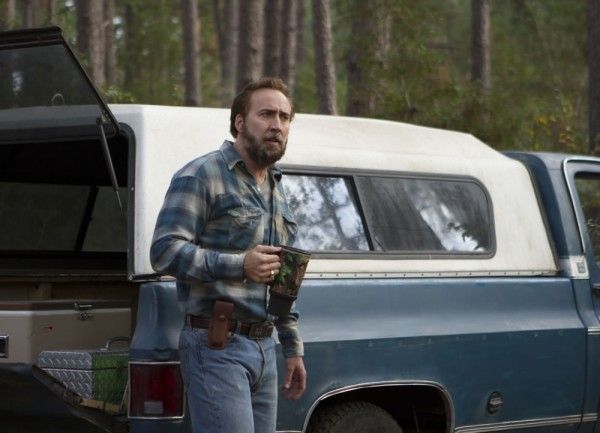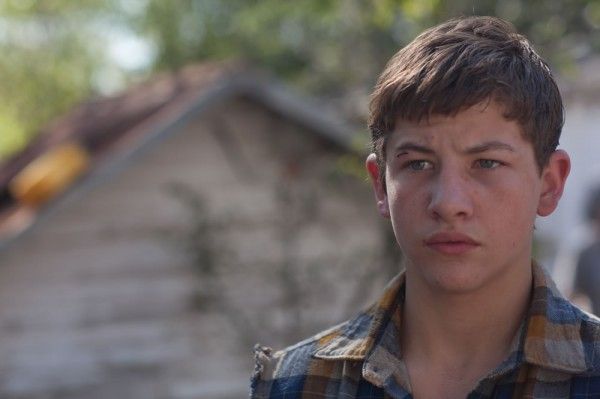One of my favorite films of the 2013 Toronto International Film Festival was David Gordon Green's Joe. Nicolas Cage plays the eponymous character who is trying to live a quiet life in a rural town, but must confront his inner demons when he meets and wants to protect Gary Jones (Tye Sheridan), a young man in danger of following in the footsteps of Joe's dark past. It's a terrific movie, and I'm so glad that audiences will be able to see it next month.
Joe will open this year's Atlanta Film Festival, so I got the chance to interview Green and Sheridan. During our conversation, we talked about moving from studio features to a trilogy of indies (Prince Avalanche, Joe, and the upcoming Manglehorn), viewing the film as a western, Joe as the last man on the frontier, Green and Sheridan's upcoming projects, the festival circuit, and much more. There's also a fun story of how Cage got Sheridan into a Snoop Dogg concert. Hit the jump to check out the interview with David Gordon Green and Tye Sheridan. The 2014 Atlanta Film Festival begins tonight and runs to April 6th. Joe opens in theaters and on VOD on April 11th.
David, you've done more Hollywood fare with Pineapple Express and Your Highness. Did that experience in Hollywood facilitate your desire to go back to back to more indie films like Prince Avalanche and Joe?
DAVID GORDON GREEN: I don't know if it was necessarily cause-and-effect. I just like different kinds of movies, and want to make different genres of movies, and movies at different scales. One thing that those experiences did do is that they all took a long time to make a studio movie. Well, it's not just even a studio movie. A movie that costs a lot of money has a lot of people involved in the process; are interested in their investment. So it's a lot of time to develop scripts and get it to a place where everyone feels very confident in making them, and the production is a long period of time because you have the time and the money and the resources to give what you need. And in the editing process you have the staff and time to explore and experiment. One of the things I wanted to do after three, prolonged movies is to do something that was really, kind-of knee-jerk decisions, and artistic instincts and strip down the process to more of a guttural level, and make something that wasn't so manicured and polished; wasn't quite so developed and supported, and just run wild with it and see what happens with it. So Avalanche was a real pleasure to make. It was a remake of an Icelandic film, but [I] wrote it in two days, financed it two meetings, shot in 16 days, edited it in five weeks; it was an amazingly condensed and efficient process, and I loved the momentum of that. I loved a lot of what the knee-jerk instinct was telling me to do, and following those detours and paths was really inspiring. And then we jumped right to a season of Eastbound [& Down] and then went into Joe and then another Eastbound and then into Manglehorn. So it's been something really exhilarating about the momentum. Now that we've got the skill set, I say "we"—the crew I've worked with over and over again on all sizes and all types of movies—we've got an experienced (we're almost seasoned at this point), but reliable filmmakers. And then trust our instincts, then give us a reasonable amount of money that's appropriate for that project, and let us run wild with it. It's been a really cool exploration of momentum as opposed to perfection.
The performances in this movie are amazing. With such a character-driven film, did you have time to find those characters on set, or were they more pre-determined going into it?
TYE SHERIDAN: I think we did a few rehearsals, but I don't feel like you can fully find the true character until you're in his wardrobe, on set, and really getting into the scene. And that's when you really find out who your character is.
Having worked with Terrence Malick and Jeff Nichols and now David, and I enjoyed your performance in all three films, what was it about these films that drew you in, and what did you take away from the experience?
SHERIDAN: The approach is different on each one. I wasn't getting cast in very many movies. I would audition a lot, and I did Tree of Life, and it came out, and then I didn't get cast in anything for a couple years until I was cast in Mud, and then I didn't get anything else until a year later when I did Joe. But I think what the actor is always looking for is that script you can't say no to. It's the one you really, really want to do, and when you book it, it's the best feeling in the world.
David, with Prince Avalanche and Joe, those movies have more of a rural setting, although obviously Joe goes beyond the forest and into a town—
GREEN: Well a lot of that ties into why Tye was the right guy for the job. I grew up in Dallas, but most of my family is from East Texas, not far from where Tye grew up in the piney forests of East Texas. It's part of the country I've spent a lot of my life in, and have great affection for, and you find these great faces and voices in these environments. Joe is based on a novel by Larry Brown that I've loved since film school, and actually our college professor did the adaptation for us. I'd worked on a documentary about Larry's life, so I got to know Larry when he was alive, and I wanted this film to kind of pay tribute to him. The novel takes place outside of Oxford, Mississippi, and I wanted to personalize it and make something that felt like my backdrop, my back yard, and then bring Larry's story to life, and kind of transplant it to Texas. And having regional faces outside of Nic, every actor in the movie is from Texas. It was nice to have the voices that felt real and authentic, and had such a naturalism.
The movie explores the notion of the closing frontier. Do you feel that Joe is one of the last outposts of this frontier that basically disappeared in the mid-1800s.
GREEN: I think Joe is trying to hang on to a frontier that doesn't really exist. He's trying to do a kind of masculinity that doesn't really exist anymore. He's trying to hang on to his own outlaw code of ethics that's very scarce. I look at the movie as a western. I think it plays to a lot of the genre elements of a western. There's redemption, a need for revenge, and a guy who doesn't necessarily abide by the law of his culture, but makes his own according to his morality. And Cage and I talked a lot about that. And the rural backdrop, again, feels like there's an un-carved path through the trees that Joe's hesitantly but constantly and aggressively cutting through, so to speak. His job is a tree poisoner. But I almost feel like it hurts him to cut into the trees. There's a kind of a gesture of pain as he swings a hatchet full of poison and injects it into the tree.
The way I read the film is that he doesn't want Gary to follow in those footsteps. Is that one of the ways he's trying to come to peace with the closing of the frontier? Is he "the last man" as it were?
GREEN: I love that reading of it, by the way. I had not thought of it in that term, but I really do feel like Joe is "the last man." I think that's a beautiful way to look at it, and he sees a lot of himself in the Gary Jones character. He's trying to protect him from decisions he knows he would make, and so he absorbs some of the domestic problems Gary has and puts them on his own shoulders, and tries to carry them through the storm, and face those challenges head-on. But I think he is in a lot of ways protecting him from what's potentially inside of him.
Regarding the similarities between Gary and Joe's characters, what was the conversation with Cage on set in terms of finding commonalities, but also their need to go their separate ways?
SHERIDAN: I think there's enough that's split between me and Nic in different categories. I mean, he's a grown man. He has a huge beard.
What?!
SHERIDAN: I was fifteen years old at the time. We have really different voices, so there was enough there to differentiate our characters.
GREEN: When it came to the characters' interior, one of the things we wanted to do was to start with their introductions almost as if it's a flashback.
SHERIDAN: And you did that.
GREEN: Right, and I think trying to parallel their lives and their universes and their similarities at their core. Sure, there's physical differences, and I don't think the audience would ever be confused about who's who, but there are few pulses of the film where you think it's a man reflecting on his life, on his youth, before you really solidify that these are two characters who are going to meet face-to-face.
SHERIDAN: Yeah, because at the beginning of the film, if you're watching it for the first time, it could be a flashback.
GREEN: I kind of feel like this with Avalanche too like where it's two characters talking to themselves. It's different sides, different side, different portraits. Avalance was very much designed to be two sides of me, personally. And then Joe, I think Joe is a lot less me. I find Gary more relatable, but I find it's kind of like a weathered version of the young man talking to himself. Time-travel movie.
Knowing what little I do about Manglehorn, there almost seems to be a similarity between Al Pacino's character, Manglehorn, and Joe in that they're both guys with these darks paths and are trying to lay low. What are some of the differences between those two characters?
GREEN: Well, Manglehorn is more of a romantic film. They're both about people who are their own outsider, in some ways outlaw kind of characters, trying to find how they group in a contemporary world where the loss of their own mythology and somewhat delusional optimism of what the world should be. But at its core, Manglehorn is a romantic story. It's a love story about a man who will never see the love of his life again, and he's trying to recreate that passion though his current relationships.
In terms of scale, is that on the same level as Joe?
GREEN: Yeah, and there's a real thread through Avalanche, Joe, and Manglehorn in that…I'm still fine-tuning Manglehorn and finishing that up…but they feel very much—it's more an urban movie than a rural movie—but there's a lot of melancholy threads of masculinity struggling with itself and trying to find its place in the universe. How it's backdrop is a natural world they're kind of in conversation with, so it does feel like a strange trilogy to me.
Do you think Manglehorn will be able to get into the festival circuit this year?
GREEN: Yeah, it will be ready. I liked the path we walked with Joe, and I think we're in a similar calendar realistically, so maybe we'll see it at Toronto this year.
A couple months ago, it was reported that you were attached to Line, is that true.
GREEN: The Line? Yeah, that one has kind of been put on hold. I've got some other projects that have kind of moved to the front…The front of the line.
I see what you did there.
GREEN: Trying to massage a couple other projects that are pretty exciting for later this year.
Are those in the indie vein?
GREEN: No, these are both studio projects. I do feel like…I relocated to Austin three years ago, and I immediately had this burst of passion for the local environment, the local stories that were boiling inside of me. And I made a very aggressive two-year run, made three movies, and feel great about all three of them. Some of the stories I've had on the back-burner, in the back of my mind, are larger scale budgeted. So I'm hoping one of these things comes together pretty soon. It opens the door to some of the larger production value, larger scope ideas that I have that would nice be flesh out. It's all about the balance.
Where did Eastbound & Down fit into all of this?
GREEN: Between every movie. It's nice because I've been exploring more dramatic content, but I need to exercise the comedic side. I get really in a melancholy place if I don't. I need stuff that's absurd and foolish and to exercise that muscle is really important to me. I just finished up Manglehorn, and I'm going to do a comedy pilot of a new series, and then jump on to the next dramatic film.
Tye, what do you have coming up in the future?
SHERIDAN: I just finished doing [Last Days in the Desert] with Ewan McGregor and [director] Rodrigo Garcia. Ewan plays a holy man in the desert and cares for his family.
Does that have the same desolate tone as Garcia's Buried and Red Lights?
SHERIDAN: Well, there are only four actors in the whole film, and Ewan McGregor actually plays two characters. So basically he's Jesus. It's hard to explain the story. It's not really a spoiler, but it's kind of hard for me to explain without me saying it. So he's Jesus. And he encounters this family, and he's also playing this devil-form of himself. So that should be interesting. I'm really excited to see that, actually.
GREEN: When you say "Holy Man", I immediately think of Eddie Murphy's finest hour. If it's anything comparable, I'm excited. [laughs]
SHERIDAN: And then maybe I'll have a couple of movies come out at the end of this year. I did a movie with John Travolta—
The Forger.
SHERIDAN: Yeah, which I don't know…I think they want to go to Toronto with it, so it may not release until some time in 2015.
GREEN: I'm really love the hustle, man.
SHERIDAN: Thanks.
With Mud, Joe, and perhaps The Forger, what has it been like for you to run the festival circuit?
SHERIDAN: It's been good. I enjoy the festivals. I love indie films and the process and having a little free time to see a couple films, which doesn't happen a lot.
GREEN: It's also cool and fun when we've gotten to bring Cage. Where you can actually have a good time and let loose.
SHERIDAN: Me and Cage actually went to a Snoop Dogg concert when we were at [SXSW]. So listen to this: They wouldn't let me into the concert. I go with my agent and a couple of publicity girls, and they wouldn't let me into the venue. They were like, "Naw, man. You got to be 21. You're not old enough, kid." And so we call up Nic, and we're like, "Hey, Nic. You want to come to the Snoop Dogg concert?" and he says, "Yeah. Tell 'em I'm bringing about 15 people." And so he shows up with his entourage, and we're going through the security, and they're like, "What did I tell you, kid? You can't come in." And Nic's like, "He's with me," and the security guy goes, "Oh, okay." So we go in and watch Snoop Dogg, so that was pretty cool.
So yeah, I've enjoyed all the festivals, all the indie drams I've been in. I'm getting ready to do this movie this summer called Scouts vs. Zombies, which is a Paramount movie. It's going to be my first studio film, so it should be interesting.
In terms of anticipation of a film coming out, is there a different feeling between a studio film about to open as opposed to a movie premiering at a festival?
GREEN: Honestly, it's one of the really nice things the lower-budget movies, independent movies, is that you don't have the pressure of an opening weekend. The expectations are very realistic, and it's nice. The festival experience is a little different because when you first premiere a movie, you have no idea—I have no idea; maybe some people have calculated it—but I'm not big on audience testing my smaller movies, so I don’t really have any expectation about what a crowd is going to think about it. And I enjoy that vulnerability. There's a strange nakedness about the process, so you can think something's really funny or really emotional, and find out their reaction.
What's been wonderful about the Joe reception is that people do find a lot to laugh at in the movie. And I think that's really important and essential, and something I was hopeful we would inject. When dealing with dramatic content like some of the dramatic situations we deal with, you don't necessarily know if that comes across too heavy, but Tye and Cage and their dynamic is really helpful to lighten it up a little bit. Make it a fun movie to watch rather than just a heavy-handed, oppressive drama.
Is it really important for you to get that humor into all of your films.
GREEN: Yeah, absolutely. Even Snow Angels, which I think was my most straight-up dramatic movie, but that's why you put Nicky Katt in the movie and Amy Sedaris in the movie and Griffin Dunne in the movie and Sam Rockwell, of course. These are really fun people who access humanity through humor in a lot of their work. And it makes the production not only that much more enjoyable, but I also think having the light within the dark is a healthy way to balance material. A ruthless, oppressive drama just isn't a way I want to spend two hours of my life. I want to connect to people, and some melancholy things, and maybe even tragedy, but there are more emotions that I always want to bring a little light into that.
When you're taking your films to festivals—if memory serves me correction, Prince Avalanche premiered at Sundance and Joe premiered at Toronto?
GREEN: Joe did Venice first.
Okay, I've not gone to Venice yet.
GREEN: That's the first time I went.
SHERIDAN: It's insane.
So what's the different vibe of premiering a film at Sundance as opposed to Venice?
GREEN: It's like Sundance is all your Hollywood buds and buddies and rolling out and high-fiving and "Hell, yeah. Here comes the movie," and in Venice, it's very elegant, and respectful…It's decadence. It's such a fun way to formalize a movie that is for us a down-and-dirty, gritty movie. And to see it with the red carpet, and rolling up in a Maserati. Like when you're driving up from the hotel to the theater, there are a fleet of men jogging alongside the car.
SHERIDAN: Maserati sponsors the whole festival. And David had a really funny idea, that I thought would have been great. He wanted James Franco to show up and chauffeur us to the red carpet.
GREEN: I think he would have if he had time.

